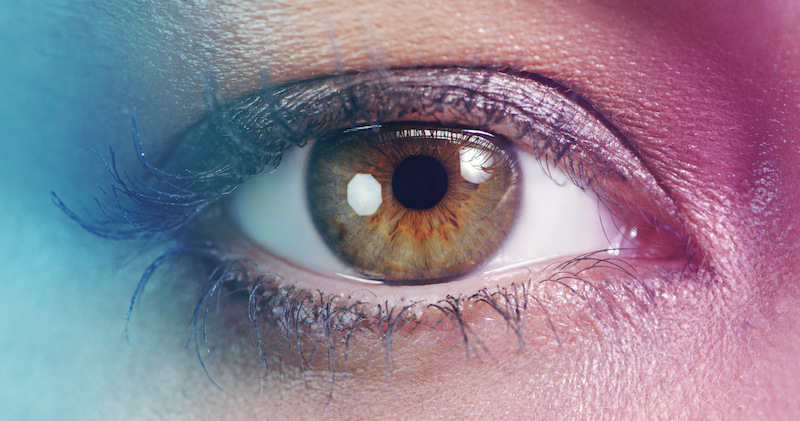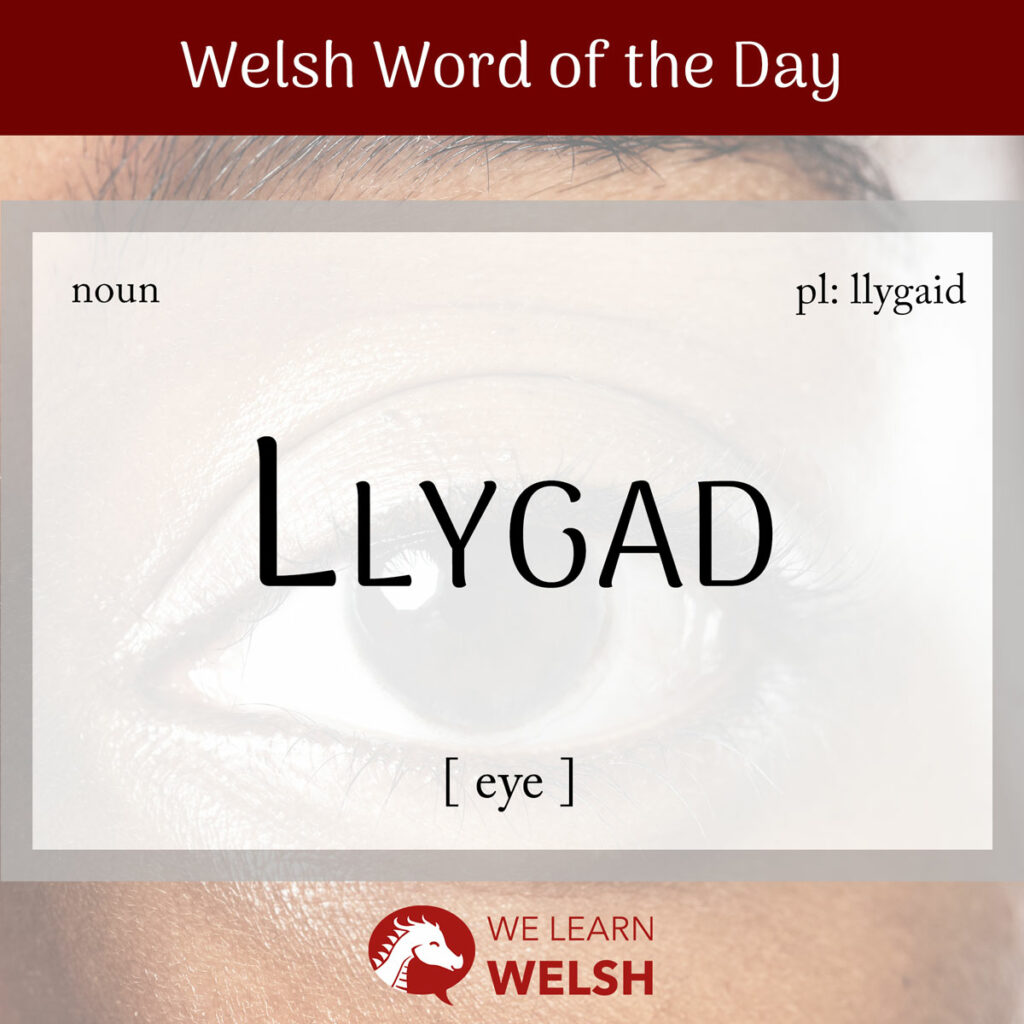Today’s Welsh word of the day is llygad, which means eye. Of course, you’ll just as often hear and use the plural form, llygaid (eyes).
llygad
eye
Other plurals are llygadau and llygadon, or the very literary word for eyes, golygon. All three are much less standard and it’s honestly very unlikely that you’ll ever come across them.
Llygad appeared in Old Welsh as licat, but further back, it almost certainly originates from the proto-Indo-European *lewk, meaning bright, to shine, or to see. This means its etymological relatives are very diverse – from the Italian lucere (to shine) to the Sanskrit rocana (shining), the English light to the Armenian lucel (to kindle).
The only mutation applicable to this word, or to its plural, is the soft mutation.
Soft mutation
lygad
Nasal mutation
N/A
Aspirate mutation
N/A
Although llygad is a feminine noun, meaning you would expect it to soft mutate after y (the), it actually breaks this rule.
This is because in Welsh the soft mutations for ll and rh behave a bit differently to other mutations. ‘Limited mutations’ are cases where a soft mutation occurs in any case except if the word begins with ll or rh. For example, a ‘limited mutation’ also happens after un (so one eye is un llygad, not un lygad).
Cases where full mutation occurs with llygad (or indeed llygaid) include instances following possessive pronouns—for example, ei lygad (his eye) or dy lygaid (your eyes).
We use our eyes for edrych (looking) and gweld (seeing), although some people have better golwg (eyesight) than others. Golwg is one of the five traditionally identified human senses, alongside gwrandawiad (hearing), y cyffwrdd (touch), arogliad (smell), and y blas (taste). However, there are plenty of other synhwyrau (senses) too, like poen (pain) and cydbwysedd (balance).
Allech chi wneud o â’ch llygaid ar gau.
You could do it with your eyes closed.
Here are some brief terms and phrases including llygad and llygaid that you might find useful in everyday conversation.
- caea dy lygaid = close your eyes
- agorais fy llygaid = I opened my eyes
- llygad am lygad = an eye for an eye
- llygad glas = a black eye
- llygadrythu = to keep one’s eyes wide
- edrych ym myw llygad rhywun = to look someone in the eye
- llygadu rhywbeth = to have one’s eye on something
- cyswllt llygad = eye contact
- cleisiau dan y llygaid = shadows under the eyes
- mae ei lygaid yn fwy na’i fol = his eyes are bigger than his stomach

In terms of the parts of the eye itself, an eyeball is pelen y llygad. Cannwyll y llygad and mablygad are both literary terms for either eyeball or pupil. And the pelen y llygad rests in twll y llygad (the eye socket).
You can use blewyn llygad to say eyelash, but blewyn amrant is probably more common. Amrant means eyelid (though in the South people sometimes use clawr llygad, eye cover). Eyebrow is ael, and
The eye’s iris is very simply its iris (though if you wanted to be extra poetic you could say enfys y llygad, the rainbow of the eye). Gwyn y llygad is the white of the eye.
Dw i’n mynd i gadw llygad arni hi.
I’m going to keep an eye on her.
Llygad can also be used in a less literal sense, to mean the centre, source, or heart of something. This is a bit like how we say eye of the storm in English – which is llygad y ddrycin in Welsh.
Other examples include llygad y ffynnon (the eye of the fountain), which is used to mean the source of running water, or yn llygad yr amser (in the nick of time). My favourite is llygad haul (the eye of the sun), used to describe a place which is illuminated with sunlight. In general, llygad is a poetic way to describe the centre of anything, especially of natural phenomena.
You can also use llygad nodwydd to mean the eye of a needle, which is exactly the same as in English.
Most people say llygaid are what they notice first when looking at someone else’s gwyneb (face), before the trwyn (nose), bochau (cheeks) and ceg (mouth). And many have strong opinions about which lliw llygaid they think is most attractive – llygaid gleision (blue eyes), llygaid gwyrddion (green eyes), llygaid brown (brown eyes), llygaid llwydion (grey eyes), or llygaid duon (black eyes).
And they’re often the most expressive part of the gwyneb (face). It has long been said or felt in many cultures that llygaid are the ffenestr (window) to the enaid (soul). Although, unfortunately, this proverb doesn’t have a direct equivalent in Welsh, the poetic way in which the word is used suggests that the romanticisation of llygaid is as strong in Wales as anywhere else.

